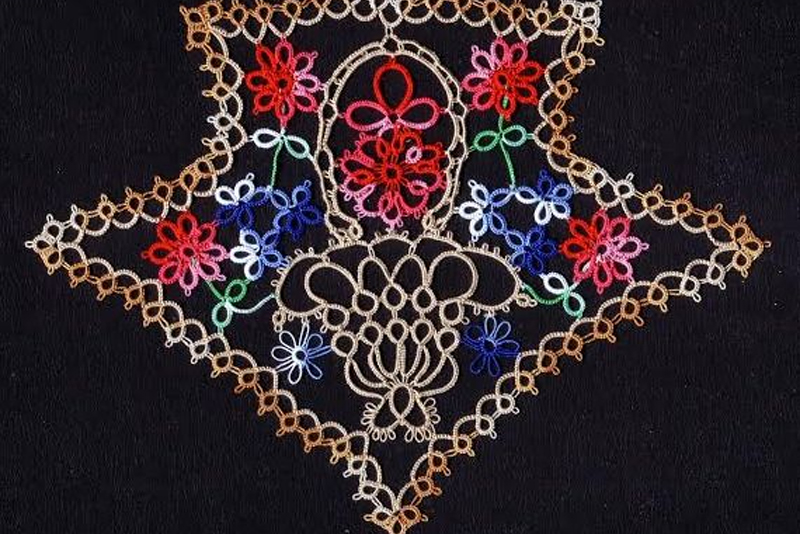Sajou Album for Frivolity Works #16

Album for Frivolity Works #16
Published ©1861 by SAJOU, Embroidery and Tapestry Patterns Manufacturer, Paris.
On my research list recently was the "Album for Frivolity Works #16 "
Published ©1861 b SAJOU, Embroidery and Tapestry Patterns Manufacturer, Paris. It has only 26 pages so I casually "page down" through it. I was surprised. The illustrations using hands to demonstrate the double stitch are familiar as are figures #10 - 20, but patterns #21 - 24 are very interesting. So I started to read the directions.
The beginning half stitch taught is called the "knot on the right side" and it is what we call the second half stitch today. The last half stitch is called the "knot on the wrong side" and it is what we call today the first half stitch. The reversal of the half stitches is not uncommon for the time as it matches what was used by Mlle Riego and its effect has been demonstrated more recently by the late Jan Stawasz, a gentleman tatter from Poland. (https://www.bellaonline.com/articles/art21772.asp)
Then there was an unusual statement on page 3 of the text:
"Essential observation. The wrong side knot is to be preferred to the right side one, which is never to be exclusively employed.
It is well to alternate with a knot by the wrong side and one by the right side. But observe always to begin with the wrong side one."
Terms also used were "eye" for ring, "purl" for picot and "scallop" for half-closed ring. The wrong side stitch, today's first half stitch, is made by "laying the loop on the left hand" instead of over the right hand. And "knot" for half stitch, but in the patterns, "10 knots" means 10 times alternating wrong side / right sides half stitches. The term "clears" was unclear to me until I found on page 7 of the text this note.
"The clears in the round scallop are made wi [sic] hat festoon stitch when sewing the trimming."
And in the directions for #19, - The purled trefoil collar. (thread #90), "Make 132 trefoils; tie them together by the purl with thread #1000..." Tie??? Tie??? Oh my gosh! They did not yet know how to join? In #23 we begin by making "crossed onglets." From studying the illustration I believe that "onglets" are created by using a tape, narrow ribbon, or rickrack and joining the points together to make first a heading and to make 8 point figures. The only tatting is an "8 point star." This is actually around ring with 8 picots which are sewn with "clears" to attach to the rickrack points.
Although published in France, this is an English language edition. It is available for a free download. The link is posted here. https://www.bellaonline.com/subjects/3137.asp



Here are the directions for pattern #16 in modern tatting notation.
Half closed ring 36 ds
Half closed ring 20 ds, place a space holder on the core thread for a later connection,
continue, 2 ds - 6 ds - 6 ds - 2 ds, slip shuttle through the space held out earlier, 20 ds
Half closed ring 10 ds - 4 ds - 4 ds - 4 ds - 4 ds - 10 ds. Repeat.
Note: The original directions advised us to "tie" or sew together the second half closed ring at the 20th ds after the ring was done.
You Should Also Read:
Jan Stawasz, Gentleman Tatter from Poland
Free Tatting Boks Online

Related Articles
Editor's Picks Articles
Top Ten Articles
Previous Features
Site Map
Content copyright © 2023 by Georgia Seitz. All rights reserved.
This content was written by Georgia Seitz. If you wish to use this content in any manner, you need written permission. Contact Georgia Seitz for details.






